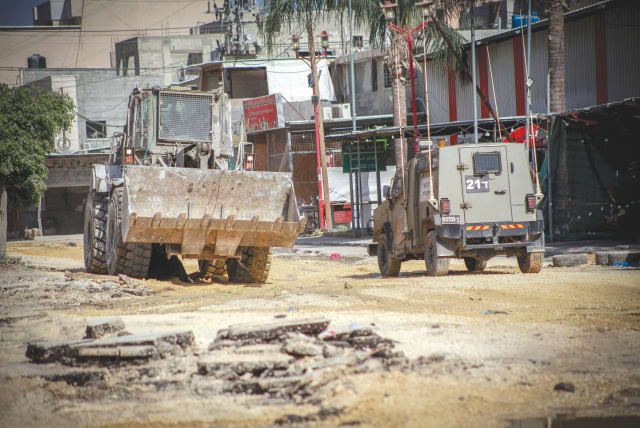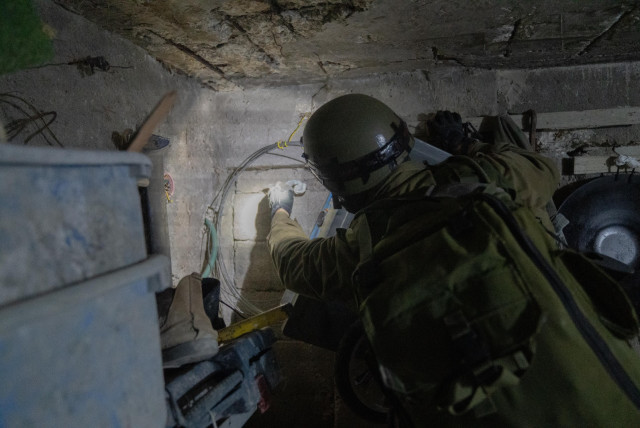The IDF's Tulkarm raid has big implications about the Palestinian Authority - opinion

It may have looked like a run-of-the-mill Israeli counter-operation in Tulkarm this week. But it’s always worth taking a closer look – because the implications can be enormous.
In addition to the war against Hamas in Gaza, the unprecedented Iranian attack, and Israel’s counterstrike, it’s easy to miss that Israel has also been fighting terrorists in areas currently controlled by the Palestinian Authority. At first, this week’s anti-terrorism raid in Tulkarm sounded like just a routine operation. But closer examination reveals three significant lessons for Israel.
On the evening of April 18, Israeli forces entered the Nur Shams neighborhood near the Palestinian Authority-governed city of Tulkarm to arrest terrorists. It should have been a standard police action. But 16 hours later, the Israelis were still there and four soldiers had been wounded by Palestinian Arab terrorist gunfire.
Why? Because this ordinary Arab neighborhood in the Palestinian Authority has a tremendous amount of heavily armed terrorists. According to Al Jazeera – the pro-terrorist Qatari mouthpiece that masquerades as a media agency – “Palestinian armed resistance fighters” were “using small arms as well as explosives” against the Israelis.
Why as the Tulkarm raid so significant?
The reason the Israelis were there at all is that the PA’s security forces weren’t. That’s the first lesson from this incident: once again, the PA refuses to fulfill its Oslo Accords obligation to arrest terrorists.
The text of Oslo II explicitly requires the PA security forces to “apprehend, investigate, and prosecute perpetrators and all other persons directly or indirectly involved in acts of terrorism, violence, and incitement.” (Annex I, Article II, 3-c).
The PA certainly has the manpower to do the job. Over the years, its original 12,000-man police force has illegally ballooned into a 60,000-man de-facto army. That makes it the sixth-largest per-capita security force in the world, with a whopping 1,250 “police officers” per 100,000 people.
Yet the PA refuses to use its forces against terrorists, forcing Israel to enter danger zones such as Tulkarm and do the job.
In recent weeks, US State Department officials and J Street types have been claiming that the new PA cabinet represents a “revitalized,” moderate, peace-seeking government. If that were the case, then surely the PA would be delighted at Israel’s action in Tulkarm. After all, if the PA is anti-terrorist, then it should be overjoyed that Israel is arresting terrorists, right?
Wrong. Here’s how the official PA news agency, WAFA, reported the incident: “The occupation army today unleashed a large-scale aggression against Nur Shams refugee camp,” and “a young man was killed by the Israeli military gunfire.” No mention of terrorists. No Arabs shooting at the Israelis. No rhyme or reason for the Israeli action – just the same old Jewish cruelty, “deliberately destroying main streets, alleyways, and water and wastewater networks.”
That’s the second lesson from this week’s Tulkarm operation – that the PA may shuffle chairs in its cabinet, but the regime’s basic pro-terrorist, hate-Israel orientation has not changed one bit. Instead of fulfilling its Oslo requirement to live in peace with Israel, the PA actively spreads misinformation in order to incite the Palestinian Arab public to hate Israel.
There’s a third lesson, too. This one requires just a glance at a map of the region.
Tulkarm is the fourth-largest PA city. Which means that if a Palestinian state is ever created, Tulkarm would be part of it. The PA is not going to agree to place Tulkarm under Israeli rule. Now if you look at a map, you see that Tulkarm is adjacent to Israel’s old, pre-1967 border. The border that made Israel just 15 km. wide at its strategic midsection.
So if right now, the city is filled with terrorists, imagine how much worse it would be if Tulkarm was part of a state of Palestine. Weapons of all kinds would flow freely into the city. Terrorists would be able to launch shoulder-fired rockets into neighboring Israeli communities, and if Israel tried to take action, it would be violating another country’s sovereign border – in other words, providing a cause for war.
So it may have looked like a run-of-the-mill Israeli counter-operation in Tulkarm this week. But it’s always worth taking a closer look – because the implications can be enormous.
The writer is a commentator on Jewish affairs whose writings appear regularly in the American and Israeli press.
Jerusalem Post Store
`; document.getElementById("linkPremium").innerHTML = cont; var divWithLink = document.getElementById("premium-link"); if (divWithLink !== null && divWithLink !== 'undefined') { divWithLink.style.border = "solid 1px #cb0f3e"; divWithLink.style.textAlign = "center"; divWithLink.style.marginBottom = "15px"; divWithLink.style.marginTop = "15px"; divWithLink.style.width = "100%"; divWithLink.style.backgroundColor = "#122952"; divWithLink.style.color = "#ffffff"; divWithLink.style.lineHeight = "1.5"; } } (function (v, i) { });

